Research
Chromosome attachment and the silencing of the spindle assembly checkpoint:
Faulty chromosome attachment by microtubules activates the spindle assembly checkpoint (SAC) to delay cell cycle progression, which is essential for genome integrity. However, it remains unclear how this checkpoint is silenced after cells have established correct chromosome attachment. Our lab has uncovered the SAC silencing network that links chromosome bipolar attachment and SAC silencing. We are currently investigating the molecular mechanism governing this critical process.

Premature silencing of the spindle checkpoint results in chromosome missegregation (red arrow). Chromosome IV (Green), Spindle (red). Jin and Wang PNAS 2013
The cellular response to the expression of damaged proteins:
Misfolded proteins can be degraded via the proteasome and autophagy. Failure in this process leads to accumulation of unfolded proteins, which contributes to the development of neurodegenerative disorders, such as Alzheimer and Huntington diseases. Using mutated Huntington as a model misfolded protein and budding yeast as a model system, we are interested in understanding why misfolded proteins are cytotoxic and how cells clear these misfolded proteins. Our recent results indicate the critical role of Cdc48/p97 segregase in antagonizing the cytotoxicity of misfolded proteins.

cdc48-3 mutants accumulate more ubiquitinated proteins, and this accumulation depends on E3 ligases San1 and Ubr1 in budding yeast. Higgins et al. 2020 Cell reports

